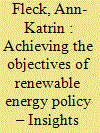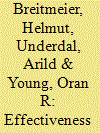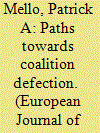|
|
|
Sort Order |
|
|
|
Items / Page
|
|
|
|
|
|
|
| Srl | Item |
| 1 |
ID:
191149


|
|
|
|
|
| Summary/Abstract |
Many countries choose policy objectives around their renewable energy expansion targets, such as efficiency and effectiveness. Due to the different nature and impact of those objectives, not all can be achieved simultaneously, so prioritising objectives is advisable. In this paper, we theoretically analyse the relationship between objectives and show that most European countries with renewable energy auctions in place have defined incoherent policy strategies in their respective renewable energy legislation. Based on these strategies, we analyse which objectives lead to the choice of which auction design elements conducting a qualitative comparative analysis. Considering 269 auction rounds from 20 European countries in the period 2011–2020, not all resulting choices of auction designs are in line with auction theory and existing literature’s findings on the relationship between objectives and auction design. Nevertheless, we show that on a country-level basis, most considered countries choose congruent auction designs, which either support all their (coherent) stated objectives or prioritise one or several of their incoherent objectives. For those countries with an incongruent auction design, we give recommendations on how to adapt their auction design depending on their exact choice of policy objectives.
|
|
|
|
|
|
|
|
|
|
|
|
|
|
|
|
| 2 |
ID:
110267


|
|
|
|
|
| Publication |
2011.
|
| Summary/Abstract |
This article uses quantitative methods to deepen and broaden our understanding of the factors that determine the effectiveness of international regimes. To do so, we compare and contrast the findings resulting from two major projects: the Oslo-Seattle Project and the International Regimes Database Project. The evidence from these projects sheds considerable light on the determinants of regime effectiveness in the environmental realm. Clearly, regimes do make a difference. By combining models and data from the two projects, we are able to move beyond this general proposition to explore the significance of a number individual determinants of effectiveness, including the distribution of power, the roles of pushers and laggards, the effects of decision rules, the depth and density of regime rules, and the extent of knowledge of the relevant problem. We show how important insights emerge not only from the use of statistical procedures to separate the effects of individual variables but also from the application of alternative techniques, such as Qualitative Comparative Analysis (QCA), designed to identify combinations of factors that operate together to determine the effectiveness of regimes. We use our results to identify a number of opportunities for additional research featuring quantitative analyses of regime effectiveness. Our goal is not to displace traditional qualitative methods in this field of study. Rather, we seek to sharpen a set of quantitative tools that can be joined together with the extensive body of qualitative studies of environmental regimes to strengthen our ability both to identify patterns in regime effectiveness and to explore the causal mechanisms that give rise to these patterns.
|
|
|
|
|
|
|
|
|
|
|
|
|
|
|
|
| 3 |
ID:
171787


|
|
|
|
|
| Summary/Abstract |
Despite widespread public opposition to the Iraq War, numerous democracies joined the US-led multinational force. However, while some stayed until the end of coalition operations, and several increased their deployments over time, others left unilaterally. How to explain this variation? While some studies suggest that democratic defection from security commitments is primarily motivated by electoral incentives or leadership change, scholars have not reached a consensus on this issue. To account for the complex interplay between causal factors, this article develops an integrative theoretical framework, using fuzzy-set Qualitative Comparative Analysis (QCA) on original data on the Iraq War involvement of 51 leaders from 29 democracies. The findings document the existence of multiple paths towards coalition defection. Among others, the results show that: (1) leadership change led to early withdrawal only when combined with leftist partisanship and the absence of upcoming elections; (2) casualties and coalition commitment played a larger role than previously assumed; and (3) coalition defection often occurred under the same leaders who had made the initial decision to deploy to Iraq, and who did not face elections when they made their withdrawal announcements.
|
|
|
|
|
|
|
|
|
|
|
|
|
|
|
|
|
|
|
|
|